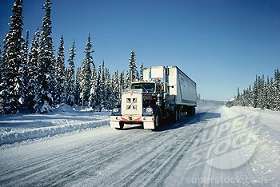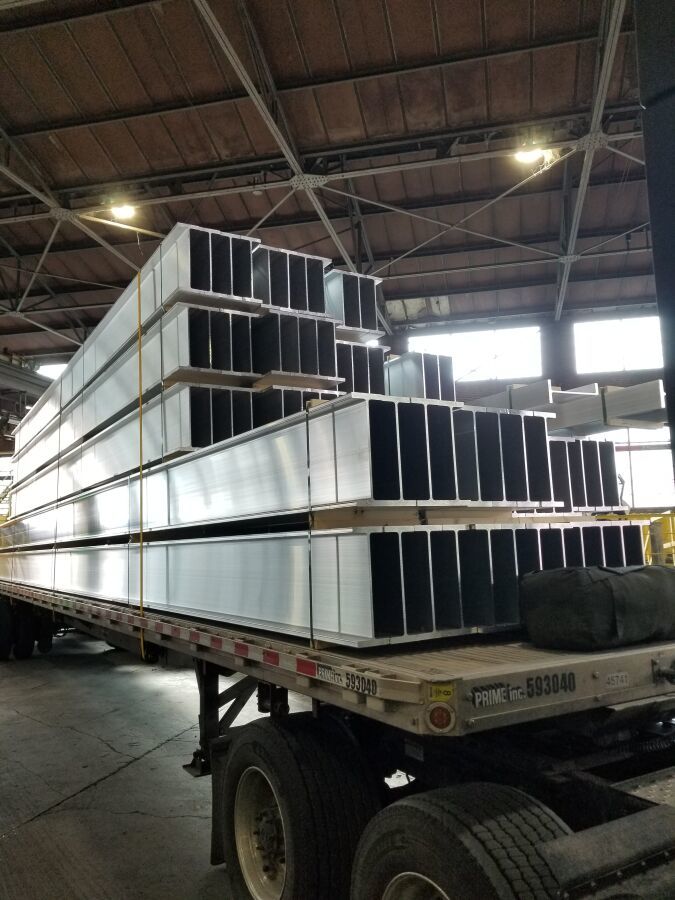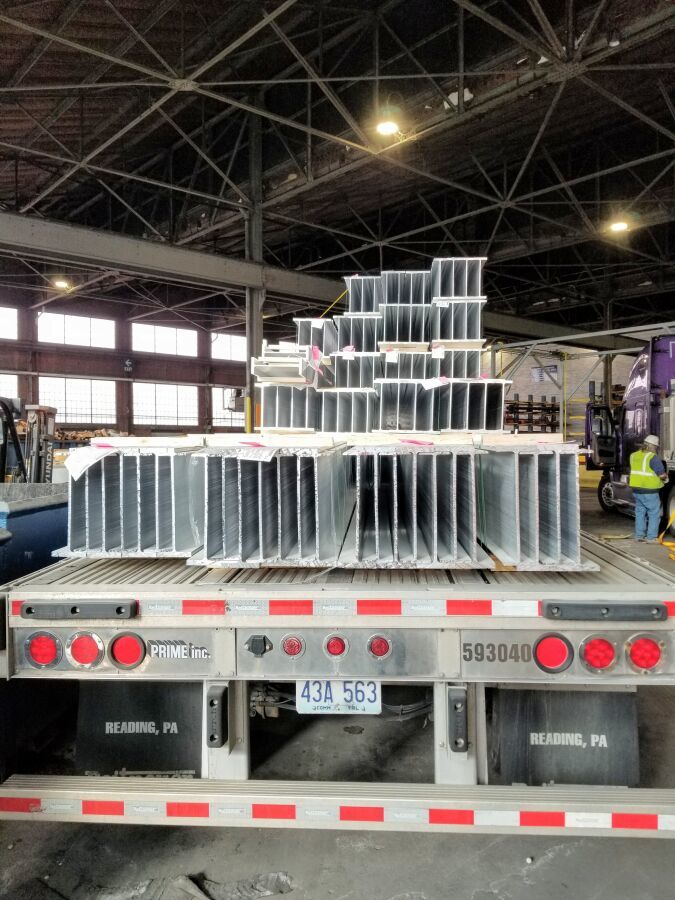Soon To Be Flatbed Truck Driver For Knight Transportation
Topic 30315 | Page 2

I do have a question that maybe someone can answer. I know that I have read that Arizona is currently under a heat advisory and often construction crews will actually do all of their work at night to avoid the dangers associated with the high temperatures. My question is, will this possibly change any part of the training process? Obviously, this wouldn't hinder any training done inside the truck while driving. What about the hours of pre-trip practice? I'm not afraid of working in the heat, as I've spent the last 10 years working outdoors in the oil field. Just wanting to get an idea of how it might change things during training.
For the Phoenix area....
I cannot speak to the training as I have not had the training as of yet... and likely, mine will be out of state. I would speculate they may do alot of the outside (non-driving) training in the early morning hours.
This week, the temps have been about 115-118F... the saving grace is that there is low humidity.... but.... hot is hot.... and it is HOT!! Temperatures peak in the mid-to-late afternoon... about 3pm to 4pm... then cool down a little for the evenings. I think this week, I have seen it about 105-110F at 10pm.
Starting Monday.... we see a cool down.... I think this week will only be 105-108F. For the next few months, plan on it easily being anywhere between 100-115F. We may see some lower temps periodically but don't count on it.
One item I did not know about before moving here..... monsoons. The monsoon season started a few days ago. Monsoon are high winds and usually rain in the mid-to-late afternoons. Monsoons seem to be sporadic... and some are actually cool looking, although the winds can be dangerous due to the blowing winds and dust storms. Ask Mr. Google about Phoenix haboobs... and you will see some cool dust storm videos. Last year we essentially had nothing for the monsoon season.... it was called the non-soons! LOL. This year TBD.
Good luck with your training. My opinion... summers here still beat the winters where I grew up. No snow shoveling, no icey roads, no freezing down to the bone.
And remember.... water, sunscreen, shade, water, and more water!!
G....
OWI:
Operating While Intoxicated
Here's a SAPA Hydro load I picked out of Cressona PA. Had to tarp it.


SAP:
Substance Abuse Professional
The Substance Abuse Professional (SAP) is a person who evaluates employees who have violated a DOT drug and alcohol program regulation and makes recommendations concerning education, treatment, follow-up testing, and aftercare.
Went to the Gulfport terminal Wednesday to get my drug test and physical done. Everything went well and everyone was super nice. Today, I found out that the hair follicle test came back negative as expected. Talked to my recruiter and they are just waiting for the results of the urine test to come back. Not sure why that's taking so long. Hopefully it'll be back soon. Was told that as soon as they get the results back I would be heading to Arizona the following Monday. I do have a question that maybe someone can answer. I know that I have read that Arizona is currently under a heat advisory and often construction crews will actually do all of their work at night to avoid the dangers associated with the high temperatures. My question is, will this possibly change any part of the training process? Obviously, this wouldn't hinder any training done inside the truck while driving. What about the hours of pre-trip practice? I'm not afraid of working in the heat, as I've spent the last 10 years working outdoors in the oil field. Just wanting to get an idea of how it might change things during training.
School usually starts at 6 am down there, we did our pre trip practice in the mornings. Top Gun we did range time in the morning, but afternoon as well some times. It was March and April when I was there, so the heat wasnt too bad. If I recall correctly, Will said they were going to be doing range training at night as well, but Im not sure on that. Hydration is king.
Ready your diary here I noticed where you mentioned there were a few things about the pre-trip that are worded differently. Do you recall anything else of significance that was different than what you may have seen from the practice material on this site? I got my driver ID number today and want to begin looking over some things, but want to try to minimize having to relearn key terms once I get there.
Terminal:
A facility where trucking companies operate out of, or their "home base" if you will. A lot of major companies have multiple terminals around the country which usually consist of the main office building, a drop lot for trailers, and sometimes a repair shop and wash facilities.
OWI:
Operating While Intoxicated
I do have a question that maybe someone can answer. I know that I have read that Arizona is currently under a heat advisory and often construction crews will actually do all of their work at night to avoid the dangers associated with the high temperatures. My question is, will this possibly change any part of the training process? Obviously, this wouldn't hinder any training done inside the truck while driving. What about the hours of pre-trip practice? I'm not afraid of working in the heat, as I've spent the last 10 years working outdoors in the oil field. Just wanting to get an idea of how it might change things during training.
For the Phoenix area....
I cannot speak to the training as I have not had the training as of yet... and likely, mine will be out of state. I would speculate they may do alot of the outside (non-driving) training in the early morning hours.
This week, the temps have been about 115-118F... the saving grace is that there is low humidity.... but.... hot is hot.... and it is HOT!! Temperatures peak in the mid-to-late afternoon... about 3pm to 4pm... then cool down a little for the evenings. I think this week, I have seen it about 105-110F at 10pm.
Starting Monday.... we see a cool down.... I think this week will only be 105-108F. For the next few months, plan on it easily being anywhere between 100-115F. We may see some lower temps periodically but don't count on it.
One item I did not know about before moving here..... monsoons. The monsoon season started a few days ago. Monsoon are high winds and usually rain in the mid-to-late afternoons. Monsoons seem to be sporadic... and some are actually cool looking, although the winds can be dangerous due to the blowing winds and dust storms. Ask Mr. Google about Phoenix haboobs... and you will see some cool dust storm videos. Last year we essentially had nothing for the monsoon season.... it was called the non-soons! LOL. This year TBD.
Good luck with your training. My opinion... summers here still beat the winters where I grew up. No snow shoveling, no icey roads, no freezing down to the bone.
And remember.... water, sunscreen, shade, water, and more water!!
G....
Thanks for the insight. Every little bit helps. I'll definitely be drinking my share of water. Also, I have a mix of electrolyte supplements which should help out as well.
OWI:
Operating While Intoxicated
Here's a SAPA Hydro load I picked out of Cressona PA. Had to tarp it.
That's quite a bit of aluminum! Is it difficult to protect your tarps (and your flesh while tarping) from all of the sharp corners?
SAP:
Substance Abuse Professional
The Substance Abuse Professional (SAP) is a person who evaluates employees who have violated a DOT drug and alcohol program regulation and makes recommendations concerning education, treatment, follow-up testing, and aftercare.
Is it difficult to protect your tarps (and your flesh while tarping) from all of the sharp corners?
Most flatbed drivers use moving blankets or carpet remnants to cover all the sharp edges and corners first. Then we put our tarps over the load. That protects the tarps from getting shredded while traveling. As far as protecting yourself from cuts and such, when you are at the aluminum plants they require you to abide by their dress code. That usually includes wearing long sleeves, long pants, steel toed shoes, and hard hat. I honestly have not cut myself in the last eight years. I haul nothing but aluminum loads. You just have to be careful and pay attention to what you are doing. You never want to get in so big a hurry that you are being unsafe. It is far better to spend an extra thirty minutes on a tarping job making sure it is secure and safe, than to spend a couple of weeks off work due to an injury.
Many of the aluminum plants have tarping machines where you don't actually lay out the tarps on the load. Most of them do not allow drivers to climb on their trailer or their load unless hooked to safety netting or fall harnesses. Safety is a big priority at these operations. Safety and common sense are sometimes at odds with each other, but for the most part if you abide by the posted rules, things will go well for you.
Went to the Gulfport terminal Wednesday to get my drug test and physical done. Everything went well and everyone was super nice. Today, I found out that the hair follicle test came back negative as expected. Talked to my recruiter and they are just waiting for the results of the urine test to come back. Not sure why that's taking so long. Hopefully it'll be back soon. Was told that as soon as they get the results back I would be heading to Arizona the following Monday. I do have a question that maybe someone can answer. I know that I have read that Arizona is currently under a heat advisory and often construction crews will actually do all of their work at night to avoid the dangers associated with the high temperatures. My question is, will this possibly change any part of the training process? Obviously, this wouldn't hinder any training done inside the truck while driving. What about the hours of pre-trip practice? I'm not afraid of working in the heat, as I've spent the last 10 years working outdoors in the oil field. Just wanting to get an idea of how it might change things during training.
School usually starts at 6 am down there, we did our pre trip practice in the mornings. Top Gun we did range time in the morning, but afternoon as well some times. It was March and April when I was there, so the heat wasnt too bad. If I recall correctly, Will said they were going to be doing range training at night as well, but Im not sure on that. Hydration is king.
NJ
Ready your diary here I noticed where you mentioned there were a few things about the pre-trip that are worded differently. Do you recall anything else of significance that was different than what you may have seen from the practice material on this site? I got my driver ID number today and want to begin looking over some things, but want to try to minimize having to relearn key terms once I get there.
If it has fluids or can leak it's CDL , cracked damaged or leaking, everything else is CDB cracked, damaged or broken. PMS properly mounted and secure. Steering linkage is pms, cdb, nor "unusually bent" also, certain items like sliding 5th wheel mounting platform are not missing any...nuts. you will get a sheet that has the entire pre trip on it and you can be tested on all of it, not just one section.
Also, ask Dan about Sexy Big Women... (Steering, Brakes, Wheels)
I can't get the link to load
YouTube, search for knight transportation pretrip automatic. That video is a complete passing pretrip done the way knight wants in, in the order they want it.
CDL:
Commercial Driver's License (CDL)
A CDL is required to drive any of the following vehicles:
- Any combination of vehicles with a gross combined weight rating (GCWR) of 26,001 or more pounds, providing the gross vehicle weight rating (GVWR) of the vehicle being towed is in excess of 10,000 pounds.
- Any single vehicle with a GVWR of 26,001 or more pounds, or any such vehicle towing another not in excess of 10,000 pounds.
- Any vehicle, regardless of size, designed to transport 16 or more persons, including the driver.
- Any vehicle required by federal regulations to be placarded while transporting hazardous materials.
Terminal:
A facility where trucking companies operate out of, or their "home base" if you will. A lot of major companies have multiple terminals around the country which usually consist of the main office building, a drop lot for trailers, and sometimes a repair shop and wash facilities.
OWI:
Operating While Intoxicated
Is it difficult to protect your tarps (and your flesh while tarping) from all of the sharp corners?
Most flatbed drivers use moving blankets or carpet remnants to cover all the sharp edges and corners first. Then we put our tarps over the load. That protects the tarps from getting shredded while traveling. As far as protecting yourself from cuts and such, when you are at the aluminum plants they require you to abide by their dress code. That usually includes wearing long sleeves, long pants, steel toed shoes, and hard hat. I honestly have not cut myself in the last eight years. I haul nothing but aluminum loads. You just have to be careful and pay attention to what you are doing. You never want to get in so big a hurry that you are being unsafe. It is far better to spend an extra thirty minutes on a tarping job making sure it is secure and safe, than to spend a couple of weeks off work due to an injury.
Many of the aluminum plants have tarping machines where you don't actually lay out the tarps on the load. Most of them do not allow drivers to climb on their trailer or their load unless hooked to safety netting or fall harnesses. Safety is a big priority at these operations. Safety and common sense are sometimes at odds with each other, but for the most part if you abide by the posted rules, things will go well for you.
Old School, I would think that one of the benefits of hauling aluminum is that aluminum is a lighter metal. Do you often have loads that come close to your trailers maximum weight limit?
Do you often have loads that come close to your trailers maximum weight limit?
I seldom have loads less than 30,000 pounds. I can haul close to 48,000 pounds. Sometimes I do. Typically they are in the 42,000 to 46,000 pound range.
Whenever possible, it is more economical for the shipper to maximize their use of the truck's capacity. Aluminum is lighter than ferrous metals, but that just means the shipper can get more of it on your trailer.
Shipper:
The customer who is shipping the freight. This is where the driver will pick up a load and then deliver it to the receiver or consignee.
New Reply:
New! Check out our help videos for a better understanding of our forum features

















Preview:
This topic has the following tags:
Knight Transport Attending Truck Driving School Becoming A Truck Driver CDL Pre-Hire Changing Careers Choosing A Trucking Company Flatbed High Road Training Program Photos Truck Driver Training







 TT On Facebook
TT On Facebook
School usually starts at 6 am down there, we did our pre trip practice in the mornings. Top Gun we did range time in the morning, but afternoon as well some times. It was March and April when I was there, so the heat wasnt too bad. If I recall correctly, Will said they were going to be doing range training at night as well, but Im not sure on that. Hydration is king.
Terminal:
A facility where trucking companies operate out of, or their "home base" if you will. A lot of major companies have multiple terminals around the country which usually consist of the main office building, a drop lot for trailers, and sometimes a repair shop and wash facilities.
OWI:
Operating While Intoxicated